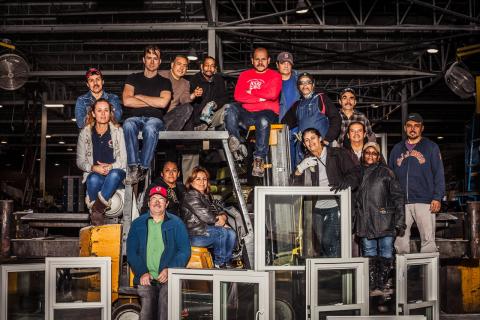Updated April 2017
The third largest city in the United States, Chicago had a population of nearly 2.7 million residents at the time of the 2010 census, and covers 237 square miles of land. The city's population is 33% African American, 28% Hispanic, 5% Asian, and the remainder mostly non-Hispanic white. It is also one of the most segregated cities in the country, with a black-white dissimilarity score of 75.9 percent according to a study of 2010 Census data, with African-Americans living primarily in the south and west side neighborhoods of the city.
Known as “the city of big shoulders” for its past reliance on heavy industry including steel and meatpacking, Chicago experienced significant industrial loss in the second half of the twentieth century. The result – as with other post-industrial cities – was population loss and urban decay. Starting the 1990s, however, those trends began to reverse as the city gained population due to a wave of new, young, and largely Latino immigrants. Meanwhile, median household income grew at twice the national average. Much of this had to do with the continued importance of the city as a transportation and trade hub, but also as a growing finance and tech center. Community wealth building institutions have played an important role in the city's turn-around as well.
Chicago has a strong history of community organizing and development rooted in labor and anti-poverty activism going back to the days of the settlement house movement started by Jane Addams in 1898 and galvanized by Saul Alinksy in the 1930s with his Back of the Yards Neighborhood Council. Ultimately Alinksy’s Industrial Areas Foundation and organizations like the Woodlawn Organization (TWO) gave Chicago a reputation as a center for organizing. At the same time, community development corporations in Chicago have earned national recognition. Mayor Harold Washington – the first African-American Mayor of the city who served from 1983 until his death in 1987 – worked to integrate neighborhood-oriented economic policies at all levels of city government.
These community-building legacies live on in city neighborhoods, programs and policies, with anchor institutions increasingly stepping up to the plate today. Both DePaul and the University of Illinois, Chicago, have actively promoted community partnerships. A new effort known as Chicago Anchors for a Strong Economy (CASE) connects institutions to local suppliers to fill their procurement needs. And New Era Windows attracted national attention in 2012 when its workers bought out their employers and took over production of energy-efficient windows in a new factory location.
An overview of these and other community wealth building efforts follows:


